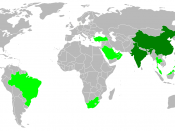A significant criterion of any industrial revolution is the diffusion of technology. However, it is not just gaining the technology that is significant but gaining foreign technologies and having the ability to implement and accept them. New technologies benefit industries by increasing output per capita this allows the industrialisation and stamps down its importance as a feature of modern economic growth. Technology has diffused largely between America and Western Europe. However pre-1914 only a few other countries experienced technological diffusion, mostly due to the fact that fewer countries were industrialising outside of Europe and America at this time.
Technological diffusion was occurring more frequently and widespread than experienced before in 1800's. Another interesting fact to look at is that diffusion would generally happen at a faster rate from nation to nation rather than region to region. Watt's Steam Engine which was introduced in Britain in 1776 but was not spread throughout the country until the 1830's.
However, France gained the technology in 1779, Germany in 1788 and Italy in 1816 and once again the whole nations didn't adopt the technology till much later. This can be explained by the fact that once a nation adopts a technology it isn't spread all over the country but in certain areas, this due to the fact the diffusion occurs a lot faster and easier between regions with similar characteristics. This can be seen by L.P. Hughes observations, he said that water wheels and turbines weren't diffused straight from Switzerland to America. They were in fact diffused to areas of similarity, from the power regions in Switzerland to the Niagara region in America.
How and when nations industrialised was dependent on several circumstances. There were many different circumstances that affected industrialisation but there were three major points. These were the current state of...


